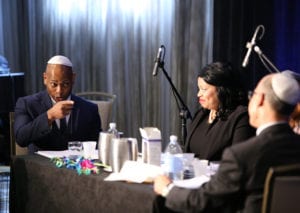
Yehuda Husband, left, who portrayed Rev. Martin Luther King Jr., during a performance of “Lost Supper” at the Cantors Assembly Convention, addresses Cantor Steven Stoehr, the author of the play, who portrayed Rabbi Abraham Joshua Heschel. (Community photo by Jessica Budnick)
American history is sprinkled with “what if’s,” many of them involving famous men whose premature deaths left historians wondering how history might have changed if they had lived.
Rev. Martin Luther King Jr. comes to mind.
In the case of King, it’s a safe bet that few have asked: “What if he had lived to share a seder dinner at the home of his friend colleague in the civil rights struggle, Rabbi Abraham Joshua Heschel?”
And yet….
Cantor Steven Stoehr of Congregation Beth Shalom in Northbrook, Illinois, has taken a creative leap in writing a one-hour, one-act play, The Lost Supper, which was performed in Louisville on Tuesday, May 21.
The play was one highlight of the 72nd Cantors Assembly Convention, which took place here.
The play is constructed around the fiction that King and Heschel – and their spouses – did, in fact, celebrate Passover at Heschel’s home in New York. On stage, Heschel dreams the whole sequence.
What’s certainly not a dream is the strong bond that had grown between the two men from their initial meeting in 1963, until King’s death in 1968. Two iconic photographs symbolize that friendship and its importance: side by side, arm in arm, crossing the Edmund Pettus Bridge in Selma, Alabama, in 1965, and standing together, outside Arlington Cemetery, in silent protest against the Vietnam War in 1968: a religious Jew from a Hasidic family in Poland and the leader of the modern American civil rights movement.
“I felt a sense of the holy in what I was doing,” Heschel said after the Selma march. He said King shared with him that “I cannot tell you how much your presence means to us.”
A sense of holy – along with music, laughter and tragedy – pervaded the Lost Supper performance in Louisville. Working on a makeshift stage in a hotel meeting room, the actors used imaginary phones and pretend food as the actor chatted, read from binders and sang spiritual songs in strong, confident voices.
That was no surprise in the case of Stoehr and Cantor Arianne Brown, who played Sylvia Straus Heschel, wife of the great rabbi, but the capacity audience also was treated to the powerful, moving singing voices of Louisville actors Yehuda Husband, who played King, and Tamika McDonald, portraying Coretta Scott King.
Early in the play, the two wives express some ambivalence about breaking matzoh together. “The Jews are not on our neighborhood list,” Coretta tells Martin. “Their hands are not pure white.” She also worries aloud about his demanding schedule, asking, “When are you going to rest?”
Martin answers, “Soon, I believe,” in one of a number of moments foreshadowing what the audience knows is around the corner. (Later, she thinks out loud, “I don’t want to lose Martin.”)
Near the end, Martin receives a phone call and is directed to watch something disturbing – a riot, maybe – on the Heschels’ television (played understatedly by an empty carton). Heschel complains to Sylvia about the interruption, but she scolds him. “They’re in our home,” she says. “They’re our friends. Their tsuris is our tsuris.”
There’s also a good amount of levity among the four. Martin grimaces at his first taste of bitter herbs, and he refers to matzoh as, symbolically, the body of Jesus, to which Heschel replies, “Jesus, a good Jewish boy.” Martin also is treated to a lesson on the Hebrew “ch” sound. (He fails.)
As the play winds down, Heschel philosophizes about a rogue’s gallery of villains in the Jewish mug files – “Haman, Hitler, or Castro.” Martin adds, “or Jim Crow.”
Martin and Coretta leave, followed by the inevitable phone call to Heschel as the dream ends.
How else could it end?


